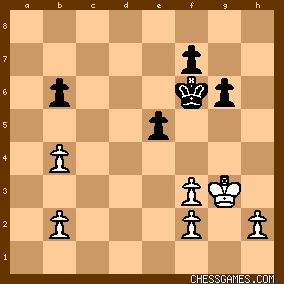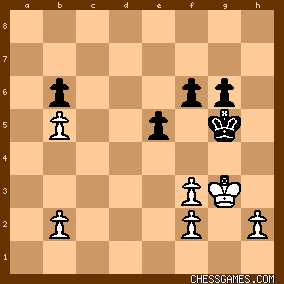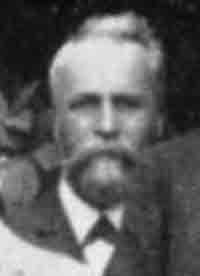|
< Earlier Kibitzing · PAGE 2 OF 2 ·
Later Kibitzing> |
| Feb-15-07 | | vonKrolock: <SBC> You're welcome! Of course, <sneaky pete>'s message is much more consistent, original and informative... |
|
| Jun-07-09 | | myschkin: . . .
Von Scheve, der recht spät zum Schach fand, hat nach Siegbert Tarrasch s Einschätzung „der Schachwelt das vielleicht einzig dastehende Schauspiel gegeben, wie sich ein guter Spieler noch im reifen Mannesalter zum wirklichen Meister entwickelt“. Er nahm in den Jahren 1887 bis 1911 mit bemerkenswerten Erfolgen an vielen internationalen Turnieren teil. Unter anderem wurde er Vierter in Leipzig 1888 und Dritter in Monte Carlo 1901. Bio (in English): http://en.wikipedia.org/wiki/Theodo... |
|
| Jun-07-09 | | Calli: <Mischkin> sehr populär bio hier, zweimal in nur sechs Anmerkungen :-) |
|
| Jun-07-09 | | myschkin: . . .
Woups², Kro must have entered my ignore somehow (cheap subterfuge) ... <Calli> from now on you're a birate! Congrats Captain
Schwamm drüber, mein Monokel muss wohl mal zum User: Autoreparaturwerkbau;) |
|
| Sep-23-11 | | zydeco: Here's some information on von Scheve, all from Google Books. He was a major in the Prussian arms (seems to have been in the artillery) stationed for a time with the Emperor of China, who decorated him personally. - George Greville More, More Society Recollections
"Von Scheve is considered one of the most studious masters in Germany. He is not thought to be very strong, but if once he gets a theoretical advantage in a game he is apt to win against the strongest antagonist." - Checkmate Magazine, Vol 1
Steinitz says that von Scheve "is regarded as a player who has learned much [he seems to have started playing seriously when he was fairly old] and plays correctly according to the principles of the modern school." - International Chess Magazine, Vol 7 |
|
| Dec-29-13 | | Karpova: His son, also named Theodor von Scheve, has been at the front as a Lieutenant since the beginning of the war. In November, he was awarded the <Eiserne Kreuz 2. Klasse> and wounded in March. He returned from the front on June 6. His other son, Götz von Scheve, has also been at the front since the beginning of the war. He was awarded the <Eiserne Kreuz 2. Klasse> in November and lately with the <Eiserne Kreuz 1. Klasse> and the <Ritterkreuz des Sachsen-Ernestinischen Hausordens>. Their father and the famous Chessmaster, Theodor von Scheve himself also had the <Eiserne Kreuz> since the battles of 1870. His father got the same medal in 1841. Source: Page 108 of the May-June 1915 'Wiener Schachzeitung' |
|
Mar-29-15
 | | MissScarlett: <The Chess News>, vol. 11, no. 113, pp.29-30, January 17, 1916: <The ranks of the German chess players are being depleted by the European war. Out of 1215 who were reported as having joined the colors, 210 were either killed or wounded. It is pleasing to note, however, that 166 have won an Iron Cross. Tartakower is one who received a decoration, but the master, Von Scheve, is among those killed.> http://babel.hathitrust.org/cgi/pt?... It's not clear if this is a mix-up, or if the son was also a master. |
|
| Jun-11-16 | | TheFocus: Happy birthday, Theodor von Scheve. |
|
| Jul-07-17 | | zanzibar: The German-speakers already noted this quote by Tarrasch: <Von Scheve, der recht spät zum Schach fand, hat nach Tarraschs Einschätzung „der Schachwelt das vielleicht einzig dastehende Schauspiel gegeben, wie sich ein guter Spieler noch im reifen Mannesalter zum wirklichen Meister entwickelt“.[1] > But they didn't let the rest of us in on it...
I can't really understand the google translation properly: <Von Scheve, who was quite late to chess, has, according to Tarrrrr's assessment, "given to the chess world the perhaps only acting play, as a good player still develops in the mature man's age to the real master." [1]> Perhaps this is a better translation:
<From Scheve, who was rather late for chess, " the chess world, where perhaps only unexampled spectacle of a good player is still developing in mature manhood, to the real master " has by Tarrasch assessment.> https://memim.com/theodor-von-schev...
. |
|
Jun-11-18
 | | offramp:
<Von Scheve took up chess fairly late in life. In Tarrasch's estimation Von Scheve <has given the current chess world a unique example of a good player still developing in late adulthood to genuine master level.>>That looks like a reasonable translation of what Tarrasch was saying. |
|
| Jun-11-18 | | morfishine: <offramp> perhaps this is the best translation: <Having spent the first half of his life as a Prussian army officer tasked with slaughtering human beings under the guise of war, Von Scheve spent the last half of his life slaughtering chess opponents with an ability rarely seen by one who took up this honorable profession so late in life> ***** |
|
| Jun-11-18 | | WorstPlayerEver: <MissScarlett> Probably a mistake. Von Scheve's 'Der Geist des Schachspiels : eine Studie' was published in 1919. |
|
Jun-11-18
 | | Telemus: <offramp> You forgot to translate the word "vielleicht". |
|
| Jun-11-18 | | ChessHigherCat: I'm no GoogleTranslate fan but in this case the bad translation is not its fault because the author should obviously have written "Beispiel" (example) instead of Schauspiel" (play/spectacle). Yet another example of Garbage-in Garbage-out |
|
Jun-11-18
 | | Telemus: <CHC: the author should obviously have written "Beispiel" (example) instead of Schauspiel" (play/spectacle).> Tarrasch's formulation is old-fashioned from todays point of view, but perfectly understandable in German. BTW, Tarrasch's quote is from "Dreihundert Schachpartien", chapter 1 "Breslau 1862-1880" (page 3 in the 2nd edition, and page 2 in the edition of Jens-Erik Rudolph, 2012). |
|
| Jun-11-18 | | ChessHigherCat: <Telemus>:
I'm fluent in German and don't like it. Look:
<Von Scheve, der recht spät zum Schach fand, hat nach Tarraschs Einschätzung „der Schachwelt das vielleicht einzig dastehende Schauspiel gegeben, wie sich ein guter Spieler noch im reifen Mannesalter zum wirklichen Meister entwickelt> "In Tarrarsch's estimation, von Scheme, who took up chess quite late in life, "has given the world of chess perhaps the only [SPECTACLE OR EXAMPLE?] of how a good player can still become a real master after reaching adulthood." Germans always defend one another but which would be the better choice here, Spectacle ("play" would be ridiculous of course) or Example? Spectacle would be conceivable in a figurative sense but only if it were really a dramatic occurrence, and I don't think an adult becoming a master is quite dramatic enough. |
|
| Jun-11-18 | | WorstPlayerEver: <CHC>
'Schauspiel' means they had no tv or youtube. So anything quickly could become a 'Schauspiel'. Certainly if it is -still- something extraordinary, I suppose My interpretation. |
|
| Jun-11-18 | | john barleycorn: <spectacle> is closest to Tarrasch's intentions. <demonstration> would be neutral, imo. then <einzig darstehende Schauspiel> would not be <only spectacle> but <unique/peerless spectacle> |
|
| Jun-11-18 | | ChessHigherCat: Fischer vs. Spassky is spectacular, but the late-bloomer Theodor von Scheve getting a master's norm in adulthood? I can hardly contain my bodily fluids! |
|
Jun-12-18
 | | offramp: <Telemus: <offramp> You forgot to translate the word "vielleicht".> Perhaps I did. |
|
| Jun-12-18 | | zanzibar: <CHC> your elaboration is helpful in understanding google's confusing translation - where I take it PLAY isn't chess play but a SPECTACLE PLAY. |
|
| Jun-12-18 | | ChessHigherCat: I honestly think he probably just misspoke and confused Beispiel (example) and Schauspiel (drama/spectacle), which are very similar words. People make that kind of mistake all the time. |
|
Nov-16-18
 | | Telemus: Scheve vs Walbrodt, 4th match game, 17 Oct 1891 (Black to move): 
click for larger view
To me 38.. g5 looks like the most simple way to draw. White's tempo moves lead nowhere and he cannot bring his king to the center. Walbrodt played 38.. ♔g5? -+. It followed 39.b5! f5. This move got a ? in Budapesti Sakk-Szemle no. 12 (1891). 40.f4+! ♔f6 41.fxe5+ ♔xe5 and White has several winning moves. 39.. f6 was better, but cannot save the game. 
click for larger view
40.b3! and the remaining tempo move is just good enough. Interesting variations for analysis happen after 40.. f5 41.f4+ exf4 42.♔f3 or 40.. ♔f5 41.h4!! (another 'only move'). |
|
| Sep-20-20 | | login:
'Schau-spiel' https://de.wiktionary.org/wiki/Scha... '.. dass es sich dabei um eine zwecklose und der Freude dienende Tätigkeit handelt [the Spiel part], welche dazu dient von allen gesehen zu werden [the Schau part].' See 'Aristotle, Metaphysics, Book 7, section 1041b' There is simply no adequate 1:1 english vocab, happens. Author's use is/was common - nothing to criticize (you pedantic Krauts ... how about explaining 'Naturschauspiel' next). |
|
| Sep-20-20 | | login:
'.. Scheve, Sekonde-Lieutnant Theodor Adolf Louis v., aus Neisse, 2. Oberschlesisches Infanterie-Regiment Nr.23, leicht verwundet durch Streifschuß am rechten Oberarm im Gefecht bei L`Hay am 30.September [1870] ..' from http://home.foni.net/~adelsforschun... You get shot, you get this
https://www.ehrenzeichen-orden.de/d...
Background (French)
https://fr.wikipedia.org/wiki/Comba...
https://lesouvenirfrancais94.fr/lha... Background (German)
https://digital.ub.uni-paderborn.de...
And some non-military Scheve (in German)
'.. Beim täglichen Dienst in Neisse spielt von Scheve auf dem Wege von und zu den Schießständen blind gegen sich selbst.
In der Ausgabe von 1876/77 der „Rang- und Quartierliste der Königlich-Preussischen Armee“ fehlt dann erstmals sein Name in der Offiziersliste des 2. Oberschlesischen Infanterieregiments Nr. 23 und erscheint dafür in der kleingedruckten Rubrik „Abgänge“. - Jawohl, er hat das Militär verlassen - wegen des Schachs! ... Im Jahre 1877 Mitbegründer des Breslauer Vereins, ging er von 1885 bis 1887 aus unbekannten Gründen nach China. Nach der Rückkehr aus China nun ließ von Scheve kaum ein nationales oder internationales Turnier aus und spielte, von manchem als Enthusiast belächelt, immer stärker. Nach dem im 50sten Lebensjahr erzielten größten Erfolg, dem geteilten 3. Platz im Eliteturnier von Monte Carlo 1901, darf man von Scheve wohl als eine schillernde Figur, eine Art „Dandy“ der internationalen Schachszene ansehen. Manchmal verbringt er einen Winter in Marseille, manchmal in Algier (wo im Café „Continental“ immer 3 Tische für die befreundeten Spieler und ihn reserviert sind), setzt zu einem Turnier nach Amerika über oder gibt Simultanvorstellungen in Russland. ..' from http://www.sk-fortuna-leipzig.de/ho... |
|
 |
|
< Earlier Kibitzing · PAGE 2 OF 2 ·
Later Kibitzing> |







